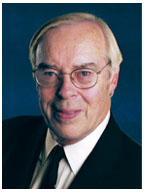
|
Photo courtesy of Weeden and Co. |
Charley Maxwell ’53
After Charley Maxwell ’53 graduated with a degree in politics, he went to Oxford on a Marshall scholarship, then joined Mobil Oil Corporation, where he worked for 10 years, learning the oil business. He left Mobil to become an energy analyst, a job he still does today. A well-regarded oil-industry commentator and stock picker, Maxwell works for Weeden and Co., an institutional investment firm. Here he speaks with PAW’s Lolly O’Brien.
How did you first get interested in oil?
I was on scholarship at Princeton, and my job was night librarian at the geological library at Guyot. I began reading books that were coming in and out of the library. In those days many young people were interested in studying Russian on the theory that we would have to deal with Russians in the coming years. But my work in Guyot suggested to me that the U.S. and North America would eventually run short of oil and become heavily dependent on the Middle East, particularly the Arab nations in the Gulf.
As an analyst, how on target have your pricing predictions been over the years?
Terrible. Occasionally I get it right. Picking the price of oil is like picking the future price of a stock. Few have great success.
How high do you think prices will go?
Does one analyst’s view matter? I believe there will be fluctuations as the price rises gradually over time. I predict the price will come down over the next two years, but will be in a sharp ascent six or seven years from now.
You predict a peak in world oil production around 2015. Why then?
We calculate it with math and graphs. It’s an accepted fact that U.S. oil production peaked in 1970—71. It is a fact that Russia peaked in 1987. The North Sea is peaking now. Looking forward, 2009—10 appears to be the time of top production for non-OPEC countries, while the peak for world production could occur sometime between 2015 and 2020. New technologies and higher prices could push it out from 2015 to 2020. If the U.S. government put a big tax on oil, consumption would drop. And that would buy us some more time.
Are there any huge undiscovered reserves?
If you mean in the obvious places, then no. Could there be a few big ones under the deepest part of the ocean? Is there some under the ice cap in Antarctica? Perhaps, but you can’t get to them with today’s instruments.
What about drilling in the Arctic National Wildlife Reserve?
It’s not a controversy that has legs. If the optimists are correct and the reserves of oil that may be left on the North Slope are equal to what has already been found – 10 billion barrels – then we would gain only about four months of future world production.
What do you make of the current administration’s energy policy?
We’re losing the opportunity of tackling the problem before it tackles us. In 1973 we were importing 37 percent of our oil, and then the Arab embargo crisis hit and we had to learn how to get along with less. We began to conserve and got the import figure down to about 30 percent. But imports have climbed to nearly 60 percent of our consumption. Under current policies, they will continue to rise to a figure over 70 percent in the next decade.
What do you think should be done?
We should have a European-type tax on all fuels to create an artificially high cost and force strong conservation efforts. And we need to put a lot more emphasis on the technical breakthroughs for clean-burning coal combustion and safe nuclear power. The U.S. has 600 years of coal reserves.
What about other sources of energy?
So-called alternatives – wind, solar, biomass burning, and hydrogen – are really so small and so expensive that for the next 10 years they don’t represent true alternatives. We are without cost-efficient ways to run our ever-greater energy-using societies over the next decade.
What will happen if we don’t mend this trend?
Growth will slow, and, historically speaking, this could lead to unrest: political, social, and economic.
What should people do?
There are ways of conserving fuels that don’t require much effort,
and these should become more attractive to thinking people. For instance,
to use as little gas as possible by organizing errands. By wearing sweaters
indoors and keeping the thermostat down to 68° F. By driving hybrid
cars with better mileage. I certainly don’t hold it against people
who drive big cars or S.U.V.s. However, a consciousness of what is likely
to come to the world in a decade or so might cause people to start practicing
what is going to be forced upon us. ![]()

